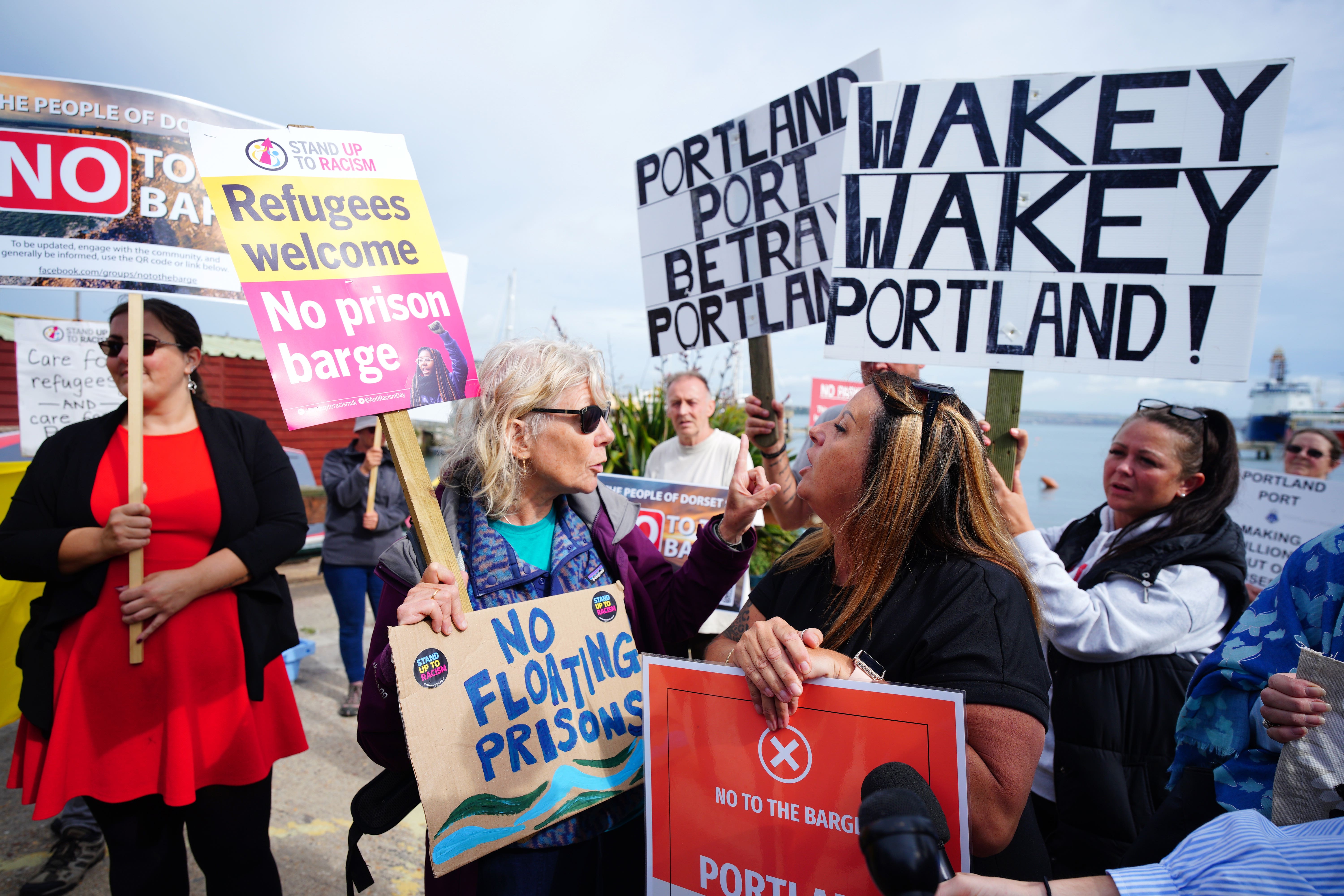Bibby Stockholm: ‘Quasi-prison’ barge delayed as asylum seekers fight move
Exclusive: Home Office sent legal letters challenging individual transfers and overall safety of vessel
Asylum seekers ordered to move to a “quasi-prison” barge are fighting the transfers, in the latest development to hit the beleaguered Home Office scheme.
No migrants are expected to arrive on the Bibby Stockholm until next week, after the timetable was pushed back yet again because of ongoing checks by the Health and Safety Executive at Portland Port.
A Home Office source denied the delays related to fire risks, and said they were partly due to local authorities’ preferences on the timing of new services.
Some asylum seekers were previously told that they would be moved to the Bibby Stockholm on Wednesday, but the Home Office has not confirmed any dates and said only that transfers would happen “as soon as possible”.
The Independent understands that lawyers representing people who have received “transfer notices” in hotels have sent a volley of letters to the government arguing the barge is unsuitable for them.
The department faces a new wave of costly legal action if it resists formal appeals to remove asylum seekers from consideration because of mental health issues, physical conditions and other vulnerabilities.
The Independent is also aware of at least one case where the Home Office sent a transfer letter to the wrong person, and widespread confusion over official notices that were marked with hotel room numbers rather than asylum seekers’ names.
Ministers announced the barge would be used for 500 asylum seekers in April, but it has not yet taken anyone on board following delays to refurbishment work, safety checks and concerns over fire risks.
Rishi Sunak did not give a date for transfers to start on Tuesday, telling journalists that checks were ongoing.
“All migrant accommodation has to go through a series of checks and inspections to make sure it complies with regulation, that’s what’s happening in this case,” he added.
“This is ultimately about fairness. I don’t think it’s fair that British taxpayers are forking out six million quid a day to house illegal migrants in hotels – I want to put an end to that.”

Katy Robinson, a partner at Wilson Solicitors, said it was representing several clients who had received official notices saying they would be moved to the barge “imminently”.
She said the Home Office had suspended some transfers already, but that there were also concerns about the “adequacy of accommodation on board in general”.
The issues raised include restrictions on movement in and out of the barge, fire and other safety risks, overcrowding and the level of medical care.
“In our experience so far it also appears that the Home Office is failing to adequately determine the individual suitability for accommodation on the Bibby Stockholm of those it is seeking to transfer, with potentially disastrous consequences,” Ms Robinson told The Independent.
“We have written to the Government Legal Department outlining these issues and await a response.”
Richard Drax, the Conservative MP for South Dorset, has likened the barge to a “quasi-prison” and urged the Home Office and vessel operators to “ensure all safety requirements are met”.

The Care4Calais charity said survivors of torture, people with disabilities and people who have experienced trauma at sea were among those facing transfer.
Chief executive Steve Smith added: “Housing any human on a ‘floating prison’ like the Bibby Stockholm is unacceptable. Doing so to people like this is completely inhumane.
“That’s why our volunteers are doing everything they can to support people to challenge the government’s decisions.”
A charity called Migrants Organise said the barge, which has had its 222 tiny cabins filled with bunk beds to increase capacity, was “simply not suitable accommodation” for vulnerable asylum seekers.
Legal organiser Brian Dikoff said its lawyers had sent “formal correspondence” to the Home Office questioning whether the barge amounts to unlawful detention, because migrants cannot freely move around Portland Port and must be taken out by an official bus.
“We are particularly concerned that many asylum seekers are not going to be able to move freely and in effect, will be detained,” he added.

“We also know from extensive experience with the asylum support system that there are serious deficiencies with the Home Office's screening and safeguarding mechanisms.”
Mr Dikoff said the charity was aware of “clearly unsuitable” people being selected for the Bibby Stockholm, including those with phobias or traumatic experiences at sea.
Government accommodation for asylum seekers works on a “no choice” principle, because it is granted on the basis that they would otherwise be homeless and destitute.
If people refuse to move when told, financial support and housing can be discontinued, and disputes can also lead to arrests for breaching immigration bail.
Ministers argue that housing asylum seekers on the barge and disused military sites is a cost-effective and necessary alternative to costly hotels.
But with a backlog of asylum claims at a record level, Ms Robinson argued: “The current need for additional asylum accommodation is entirely of the government’s own making in failing to process asylum claims promptly and fairly, and should not result in individuals being accommodated unsuitably or where they are unsafe.”
Join our commenting forum
Join thought-provoking conversations, follow other Independent readers and see their replies
Comments


Bookmark popover
Removed from bookmarks